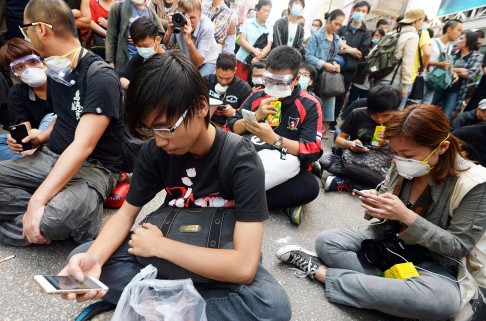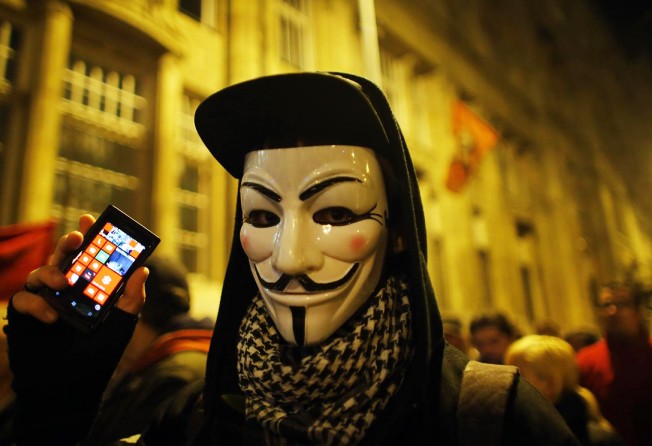
Tweeting about a revolution
Instant reporting on social media platforms has changed public protests forever

Want to change the world? Start a Tweet-storm. Armed only with smartphones, protesters across the globe are routinely using social media platforms to present their own version of live events, dodging mainstream media outlets to quickly spread the word around a city, a country, and even the planet.
From the Arab spring and Turkey's brief banning of Twitter in March, to the Israeli-Palestinian conflict and Hong Kong's Occupy Central with Love and Peace (OCLP) movement, social media is playing a pivotal role in the success - and the failure - of protest movements everywhere.
Platforms including Twitter, Facebook, Instagram, Reddit, Vine and WhatsApp can also become critical sources of news during emergencies, if trusted news and government websites get hacked or taken over.
However, social media is mostly about getting exposure. "In today's online-focused society, social media makes or breaks a protest," says Dinah Alobeid at the New York office of the analyst company Brandwatch, who has been studying the social media activity surrounding the OCLP movement. "There is no middle ground. If it's not trending on Twitter or flooding Facebook, then it most likely isn't gaining traction on the ground."
The social media conversation about OCLP was only fleeting. Data from Brandwatch shows that between September 11 and November 10, there were a mere 127,000 mentions of OCLP on social media. (Although that's possibly because other hashtags were created after the protests broke out in late September, such as #OccupyMongkok, #OccupyCausewayBay and even #OccupyHK. Then came #UmbrellaMovement.)
Social media has played a huge role in struggles elsewhere. "When the Turkish prime minister banned Twitter, tweets about the ban and those from Turkey itself increased significantly," Alobeid says. "When Boko Haram kidnapped more than 200 schoolchildren in Nigeria, the #bringbackourgirls hashtag and social activism campaign brought global awareness to the situation."
The civil war in Syria, the Israeli-Palestinian conflict (#GazaUnderAttack and #FreePalestine) and the Islamic State campaign are recent examples. "These situations are being amplified by civilians in those regions through Twitter, Facebook and YouTube despite serious threats to their safety from governments or rebel groups for doing so," Alobeid says.
It works both ways; Islamic State was using Twitter to give live updates during fighting, and it also had a presence on YouTube, Instagram and Facebook, provoking concern that social media is causing the top-down hierarchy of terrorist organisations to be replaced by unpredictable group decision making.
The political landscape's tools are clearly changing very fast. A viral social media campaign usually signifies a movement gaining support from people around the world, but that hasn't happened with the OCLP. Not that social media has been silent; online chat spiked on September 29, with nearly 22,000 mentions, when it was reported that Hong Kong police had used tear gas on protesters.
"The movement also received momentum in the following days when drone footage of the protesters and umbrellas was released, leading to the #UmbrellaRevolution hashtag, Alobeid says. Beyond that, over the past few months there hasn't been as much online chatter about the movement as expected.
Staging a viral social media campaign demands a good handle, and in this case it's @oclphk. However, most official news outlets are using it, including SCMP, Al Jazeera, Bloomberg, Mashable, BBC Breaking News and RT Network.
The movement has about 25,900 Twitter followers, a tiny amount compared to @occupywallst with more than 203,000 followers, Alobeid says. New York's Occupy Wall Street protests, which began in 2011, didn't exactly light up the internet.
In today's online-focused society, social media makes or breaks a protest
A problem for OCLP, has been the lack of viral posts. "While most activism campaigns in the last two years have thrived on viral posts, endorsement via social media influencers, and large volumes of tweets and retweets, the online discussion about the OCLP is almost evenly split between news outlets and social media platforms," she says.
The one exception was the week of September 28 when there was a significant increase in mentions of OCLP on Twitter. Discussion has so far been dominated by men (almost two thirds) and journalists (22 per cent), which gives a flavour of just how socially limited the online discussion has been.
Social media thrives on divisive, polarising points of view, and that's not happening with OCLP. "The most mentioned topics of Occupy Central include 'Hong Kong', 'Hong Kong Police', 'OccupyCentral protests' and others in a similar vain," Alobeid says. "The crux of their movement, occupying with 'love and peace' was not one of the most discussed topics."
Although Twitter is painted as being critical to a conversation, successful campaigns usually show activity on multiple platforms. Facebook is the obvious second choice, but without hashtags and handles, it can be harder to navigate than Twitter for those after information on a single issue. However, this network of 1.2 billion people can help create far-reaching discussion. Just look at the summer #IceBucketChallenge craze.
Private groups on Facebook - as well as the new Facebook Messenger app - can offer protest organisers an easy tool to manage and communicate with a potentially huge audience.
Whatever the platform, anyone wanting global recognition of a cause should keep it short. Not strictly a social media platform, weblink shortener bit.ly bitly.com has a significant role to play in disseminating news far and wide.
"New media outlets that use bit.ly are more likely to spread information outside the region than inside it, acting like a megaphone more than a rallying cry," says the United States Institute of Peace in its report Blogs and Bullets II: New Media and Conflict after the Arab Spring.
"This dissemination could be significant if it had a boomerang effect that brought international pressure to bear on autocratic regimes, or helped reduce a regime's tendency to crack down violently on protests."
In short: if you want to get the West on side, use Bitly.
Rather more surprisingly, the internet's "best of" platform Reddit has become a useful gauge of opinion, and also seems to be spiking in popularity as a breaking news platform.
Getting support for a political movement now hinges on the success of trending hashtags and handles. Social media amplification of a message is as much about getting a global mainstream audience as local or regional attention. However, if you want to create a social media-charged movement, choose yout 140 characters wisely.